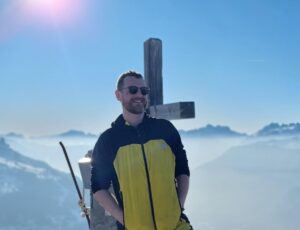A Brighton nurse is preparing to swap resus rooms in the Accident and Emergency (A&E) Department for a chance to scale six of the world’s highest mountains.
Christopher Smith not only plans to climb the challenging peaks but to ski down afterwards as part of a once-in-a-lifetime expedition.
Mr Smith is part of a team taking on the Last Ride project, with the aim of becoming the first people to climb and ski the tallest mountain on each of the seven continents.
The team will tackle mountains from Kilimanjaro, in Africa, to Mount Vinson, in Antarctica, and culminating in a winter expedition to Everest.
The project, a world first in global ski mountaineering, is intended to develop a better understanding of climate change, showcase the beauty and fragility of our world, and share innovative and actionable strategies to preserve it.
The team consists of professional skiers, Ed Salisbury and Will Tucker, film director and cinematographer Jon Moy and Mr Smith, who will provide the medical skills.
On each trip, they will be joined by local teams to help them on their journey and become key characters in the Last Ride story.
They aim to be the first people – and they may be the last – to climb up and ski down the tallest mountain on each of the seven continents.
They climbed the first peak, Elbrus, in Russia, last September and they aim to climb and ski down Everest in 2024.
The team is currently in Tanzania for Kilimanjaro, the second peak. This is the only trip of the seven that Mr Smith is not joining, with a local medical team providing cover.
The team’s journey – and the film that they produce – is intended to create a platform to discuss the effects of global deglaciation on the climate and our lives.
Mr Smith, who works at the Royal Sussex County Hospital, in Brighton, said: “I found out about the project through Jon – a good friend. It had always been an ambition of mine to climb these high-altitude mountains.
“With my A&E skills and my mountaineering and skiing experience, I found my way in as expeditionary medic.

“Though I have climbed Kilimanjaro (5,895m) and been to Everest base camp (5,364m), this is a whole new challenge.
“I’ve worked in A&E at the Royal County Sussex Hospital for 10 years, progressing from healthcare assistant to resus nurse.
“I feel like the skills you acquire in A&E and resus at a major trauma unit really equip you well for this kind of expedition.
“I’ve also had extra training in wilderness and expeditionary medicine with a company called World Extreme Medicine. Their courses provide you with a really strong background for these kinds of adventures.
“This course really made me think about how to adapt the skills that we have in A&E to extreme environments like mountain terrain.
“Unfortunately, on a mountain you do not have all of your resus equipment so we will have to improvise.”
Mr Smith added: “I’m looking forward to using these skills that I’ve developed and honed at University Hospitals Sussex (the NHS trust that runs the Royal Sussex) to keep the team safe and healthy because a healthy team is a successful one.
“I am so grateful to University Hospitals Sussex for allowing me time off to complete the expeditions when I am needed.

“Other than acting as first responder on the mountain, my job involves a lot of planning and preparation.
“Each team member will have prompt cards to cover most of the eventualities that we may come across – much like the Royal Sussex County Hospital’s resus prompt cards.
“So for example, if anyone, or even myself were to get injured, the team would know what to do as directed by the prompt card.”
The project is fraught with danger – the risk of frostbite, altitude sickness, avalanches, rock and landslides, storms and falling into crevasses to name a few. But the team believe that it’s worth the risks to contribute to the fight for our natural world.
Mr Smith said: “We will be working with some innovative organisations to combat our project’s carbon footprint through reduction, offsetting and capturing and will be including this process in our story.
“Ultimately our goal is to provide local communities with an audience to share their experiences and to search for positive solutions to the climate crisis.
“Sadly, we will most likely be the last people who are able to do this challenge as the glaciers are melting at an unprecedented rate.
“For example, scientists project that the glaciers at Puncack Jaya in Indonesia will have disappeared by this time next year. It’s a race against time.”
Mr Smith will rejoin the team when they head to Puncack Jaya in September, followed by trips to Denali, in Alaska, later this year, then Aconcagua, in Argentina, and Mount Vinson, in Antarctica, next year, before tackling Everest in 2024.
To find out more about the Last Ride and to make a donation to help fund the expedition, go to https://gofund.me/f836a4ef.








